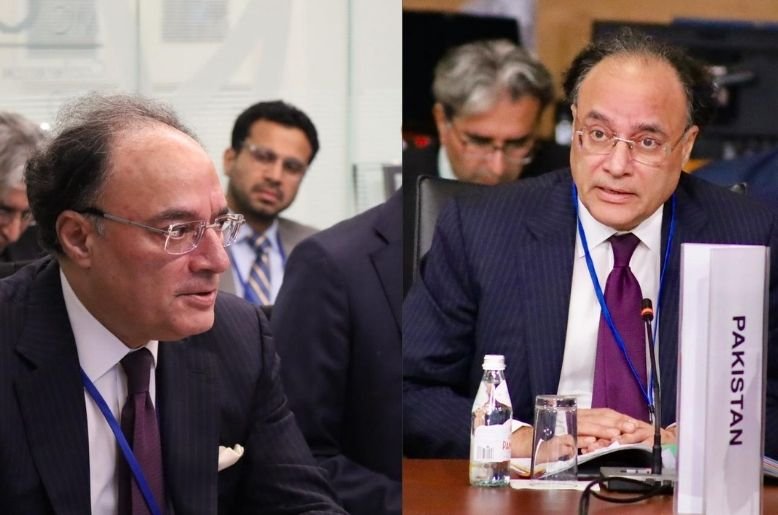Federal Finance and Revenue Minister Senator Muhammad Aurangzeb attended the Commonwealth Finance Ministers Meeting (CFMM) on the sidelines of the IMF–World Bank annual meetings, urging a delivery-focused agenda to build resilience amid global policy shifts.
Article at a glance
| Area/Meeting | Key points | Outcomes / Next steps |
|---|---|---|
| CFMM (IMF–WB week, Washington D.C.) | FM urged a delivery-first agenda. | Push to operationalize Commonwealth Infrastructure. |
| Climate finance | Called to activate the Loss & Damage Fund. | Seek faster access/flows for climate-vulnerable members. |
| Meeting with Citi | Cited stabilizing macro indicators and digital finance momentum. | Govt to review Citi proposals; continue long-term partnership. |
| US-Pakistan Business Council | Said private sector must lead growth. | Deeper G2G/B2B engagement. |
| Trade/tariff deal (US) | Reported successful negotiations with US. | Implement tariff deal. |
| US Treasury meeting | Highlighted IMF-backed reforms. | Invited US investment in oil & gas, minerals, agriculture, IT, pharma. |
| IFC engagement | Welcomed regional office in Islamabad. | Aim for early financial closure of Reko Diq. |
| Investment focus | Mines & minerals, agriculture, IT, pharmaceuticals; digital financial services. | Convert meetings into pipeline deals. |
FM Aurangzeb at WB forum backs private sector led farm growth in Pakistan
Federal Finance Minister and Senator Muhammad Aurangzeb, speaking at the World Bank’s “AgriConnect: Farms, Firms, and Finance for Jobs” in Washington DC, said agriculture “contributes nearly one-fourth of GDP” and supports “millions of small farmers,” reaffirming a “policy shift from control to facilitation and empowerment,” with the “private sector to take the lead.”
He spotlighted reforms to “boost agricultural productivity, access to finance, and value-chain development from production and storage to exports,” noting pilots using “better seeds, fertilizers, agronomy services, and satellite-based crop monitoring,” delivering “higher yields and incomes.”
To widen credit, the government is expanding lending via “first-loss guarantees, subsidised financing, and uncollateralized credit.”
Addressing the “growing threat of climate change,” he cited the “ten year Country Partnership Framework,” with “one third of the agenda focused on climate resilience and de-carbonization.”
Pakistan is investing in research “around 1,000 Pakistani students” study “advanced agriculture in China” and enabling “cold chain infrastructure” and “warehousing,” with rice exports “expected to reach USD 3.5 billion.”
He aims for a “resilient, technology driven, and inclusive” sector contributing “nearly 40%” of GDP when the full value chain is counted.
At CFMM: delivery-first agenda and climate finance
Addressing ministers, Aurangzeb called for prioritizing actions over pledges to move toward a resilient, prosperous Commonwealth.
He backed operationalizing the Commonwealth infrastructure, Financial Resilience Hub, and Technical Assistance Fund for peer review and capacity building.
For countries like Pakistan, he stressed the centrality of climate finance and the need to operationalize mechanisms including the Loss and Damage Fund.
With Citi: macro stabilisation and digital finance pitch
In a meeting with Citi executives Milos Stefanovic and Jaya Dutt, the minister acknowledged the bank’s long partnership.
He also outlined stabilising macroeconomic indicators driven by structural reforms. Moreover, developments he said have been recognised by international rating agencies.
He highlighted Pakistan’s emergence as a growing hub for digital innovation and financial services, and said the government would review Citi’s proposals.
US-Pakistan Business Council: private sector to lead growth
Hosted by the US-Pakistan Business Council, Aurangzeb briefed participants on improving macro indicators and reiterated that the private sector must lead.
He pointed to a negotiated trade/tariff deal with US authorities and sought deeper G2G and B2B engagement in mines and minerals, agriculture, IT, and pharmaceuticals, while noting the government is working to provide maximum relief to businesses.
US Treasury and IFC: tariff deal, virtual assets, and Reko Diq
Meeting Assistant US Treasury Secretary Robert Kaproth and Counselor Jonathan Greenstein, Aurangzeb welcomed successful negotiations leading to a tariff deal, underlined strong fundamentals under the IMF program, and briefed on virtual asset regulation efforts.
Earlier, in talks with IFC Regional Vice President Riccardo Puliti, he praised IFC’s support for Pakistan’s 10-year Country Partnership Framework, agreed to pursue early financial closure of IFC’s flagship Reko Diq project, and welcomed IFC’s regional office in Islamabad.




